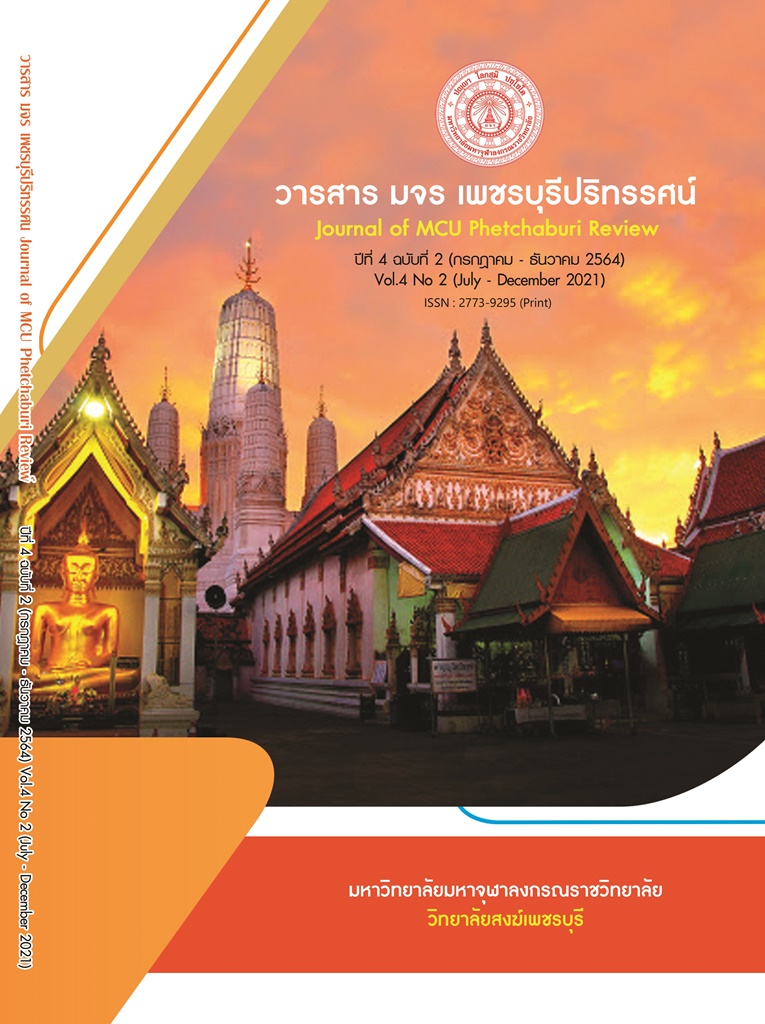SARANI DHARMMA PRINCIPLES: SYNTHESIS FOR COMMUNITY DEVELOPMENT WITH THE PARTICIPATION
Main Article Content
Abstract
Academic article in Sarani Dharmma Principles: Synthesis for Community Development with The Participation. The findings revealed that Bringing the principles of Saranee Dharma together with community development as a development guideline that will help support one another and bring awareness to each other. This is to create respect and obedience to each other, and to create unity which is an important basis for people's participation in the community, consisting of 1) Creating love and goodwill for everyone in the community. 2) Conversation with beautiful words speak politely speak with love mutual understanding and goodwill, along with speaking to encourage each other to convey the meaning of building morale for people in the community. 3) Positive thinking, good thinking and creative thinking in a systematic way for doing various community development activities and benefiting from joint activities. 4) Not separating or dividing parties There is fairness and equality for all people in the community equally. 5) Maintaining the rules and regulations agreed upon in the community orderly Discipline and security for peaceful coexistence among multicultural or diverse cultures. 6) People in the community and agencies from all sectors create a participatory way of thinking together and doing creative activities in joint planning for community development with the same opinion and without conflict. For the common goal is the community can develop sustainable according to their needs happily and create quality of life for people in the community.
Article Details

This work is licensed under a Creative Commons Attribution-NonCommercial-NoDerivatives 4.0 International License.
References
กองแผนงาน กรมการพัฒนาชุมชน. (2559). แผนยุทธศาสตร์กรมการพัฒนาชุมชน พ.ศ. 2560 - 2564. กรุงเทพมหานคร: กองแผนงาน กรมการพัฒนาชุมชน.
ชยาภรณ์ ชื่นรุ่งโรจน์. (2564). ชุมชนและการพัฒนาชุมชน. เรียกใช้เมื่อ 22 สิงหาคม 2564 จาก http://www.human.cmu.ac.th/home/hc/ebook/006103/lesson10/02 .htm
นันทิยา หุตานุวัตร และณรงค์ หุตานุวัตร. (2546). การพัฒนาองค์กรชุมชน. กรุงเทพมหานคร: สถาบันพัฒนาองค์กรชุมชน (องค์การมหาชน).
นิพัฒน์ ชัยวรมุขกุล. (2555). การพัฒนาคืออะไร. เรียกใช้เมื่อ 19 สิงหาคม 2564 จาก https://www.gotoknow.org/posts/485293
ปกรณ์ ปรียากร. (2538). ทฤษฎีและแนวคิดเกี่ยวกับการพัฒนาในการบริหารการพัฒนา. กรุงเทพมหานคร: สามเจริญพานิช.
พระบุญโชค กิตฺติสาโร (คำภีระ). (2555). ประสิทธิผลการบริหารการพัฒนาชุมชนขององค์การบริหารส่วนตำบลเขาวง อำเภอพระพุทธบาท จังหวัดสระบุรี. ใน (วิทยานิพนธ์พุทธศาสตรมหาบัณฑิต สาขาวิชาพระพุทธศาสนา). บัณฑิตวิทยาลัย มหาวิทยาลัยมหาจุฬาลงกรณราชวิทยาลัย.
พระปลัดบุญมี คุณากโร (โพธิศรีสม). (2563). การศึกษาวิเคราะห์การใช้หลักสาราณียธรรมในการอยู่ร่วมกันอย่างสันติของชุมชนเทศบาลเมืองปาดังเบซาร์ จังหวัดสงขลา. วารสารมหาจุฬานาครทรรศน์, 7(4), 132-143.
พระราชวรมุนี, (ประยุทธ์ ปยุตฺโต). (2530). ทางสายกลางของการศึกษาไทย. กรุงเทพมหานคร: คณะศึกษาศาสตร์ มหาวิทยาลัยเกษตรศาสตร์.
พระสมุห์อมร อมโร (สีดำ) และคณะ. (2562). หลักสาราณียธรรม : แนวทางการประยุกต์ใช้หลักสาราณียธรรมในการมีส่วนร่วมของชุมชนบ้านช่อง ตำบลช่อง อำเภอนาโยง จังหวัดตรัง. วารสารมหาจุฬานาครทรรศน์, 6(4), 1726-1742.
ไพรัช อรรถกามานนท์ และมัทนา โชควรวัฒนกร. (2548). การส่งเสริมชุมชนและท้องถิ่นในการปฏิรูปการศึกษา. กรุงเทพมหานคร: สำนักงานปฏิรูปการศึกษา.
ยุทธนา กาเด็ม. (2563). การพัฒนาชุมชนจังหวัดชายแดนภาคใต้ตามหลักการขององค์การสหประชาชาติ (UN). วารสารมหาวิทยาลัยราชภัฏยะลา, 15(2), 257-264.
ยุวัฒน์ วุฒิเมธี. (2538). หลักการพัฒนาชุมชนและการพัฒนาชนบท. กรุงเทพมหานคร: ไทยอนุเคราะห์ไทย.
รัถยานภิศ รัชตะวรรณ และคณะ. (2561). กระบวนการมีส่วนร่วมของชุมชนในการพัฒนาสุขภาวะ. วารสารเทคโนโลยีภาคใต้, 11(1), 231-238.
รุ่งกานต์ ปราชญ์ศรีภูมิ. (2555). การพัฒนาแบบมีส่วนร่วม. เรียกใช้เมื่อ 18 สิงหาคม 2564 จาก https://www.gotoknow.org/posts/77448
วชิรวัชร งามละม่อม. (2558). แนวคิดการมีส่วนร่วมในการพัฒนาในชุมชน. เรียกใช้เมื่อ 18 สิงหาคม 2564 จาก http://learningofpublic.blogspot.com/2015/09/blog-post_28.html
วันชัย วัฒนศัพท์ และคณะ. (2551). คู่มือการมีส่วนร่วมของประชาชนการตัดสินใจที่ดีกว่าโดยให้ชุมชนมีส่วนร่วม. กรุงเทพมหานคร: สถาบันพระปกเกล้า.
วีรศักดิ์ สุรเมธี. (2555). สาราณียธรรม 6. เรียกใช้เมื่อ 20 สิงหาคม 2564 จาก https://www.gotoknow.org/posts/460447
ศักรินทร์ สุวรรณโรจน์. (2543). การปฏิรูปการศึกษากับการพัฒนาวิชาชีพครู. กรุงเทพมหานคร : สำนักงานคณะกรรมการข้าราชการครู.
สนธยา พลศรี. (2547). ทฤษฎีและหลักการพัฒนาชุมชน. กรุงเทพมหานคร: โอเดียนสโตร์.
สามารถ มังสัง. (2562). สาราณียธรรม 6 : หลักการในการอยู่ร่วมกัน. เรียกใช้เมื่อ 24 สิงหาคม 2564 จาก https://mgronline.com/daily/detail/9620000029668
สำนักงานกองทุนหมู่บ้านและชุมชนเมือง. (2546). รายงานการสังเคราะห์สารนิพนธ์บัณฑิตกองทุน หลักสูตรประกาศนียบัตรบัณฑิต สาขาการจัดการและการประเมินโครงการ. กรุงเทพมหานคร: สำนักงานคณะกรรมการกองทุนหมู่บ้านและชุมชนเมืองแห่งชาติ, สำนักงานสภาสถาบันราชภัฏ กระทรวงศึกษาธิการ, ทบวงมหาวิทยาลัย.
สุมิตร สุวรรณ. (2554). รัฐกับแนวคิดและทฤษฎีการพัฒนา. นครปฐม: มหาวิทยาลัย เกษตรศาสตร์.
องค์การบริหารส่วนตำบลหนองช้าง. (2563). ความหมายของการมีส่วนร่วมของประชาชน. เรียกใช้เมื่อ 18 สิงหาคม 2564 จาก http://nongchang.go.th/public/list_upload /backend/list_637/files_1574_1.pdf.
Batten, T. R. (2021). Community development. Retrieved August 22, 2021, from http://www.human.cmu.ac.th/
Bouneaw, J. (2007). The Participation in Research for Locally. Chiang Mai: Chiang Mai University.
Creighton, J. L. (2005). The Public Participation Handbook: Making Better Decisions through Citizen Involvement. San Francisco: Jossey Bass.
Keith, D. D. (1972). Human behavior at work human relations and organization behavior. New York: McGraw-Hill.
Worapradit, S. (2010). Community Participation Division of Information Technology Office of the Non-Formal and Informal Education Trat Province. Trat: Office of the Non - Formal and Informal Education Trat Province.


